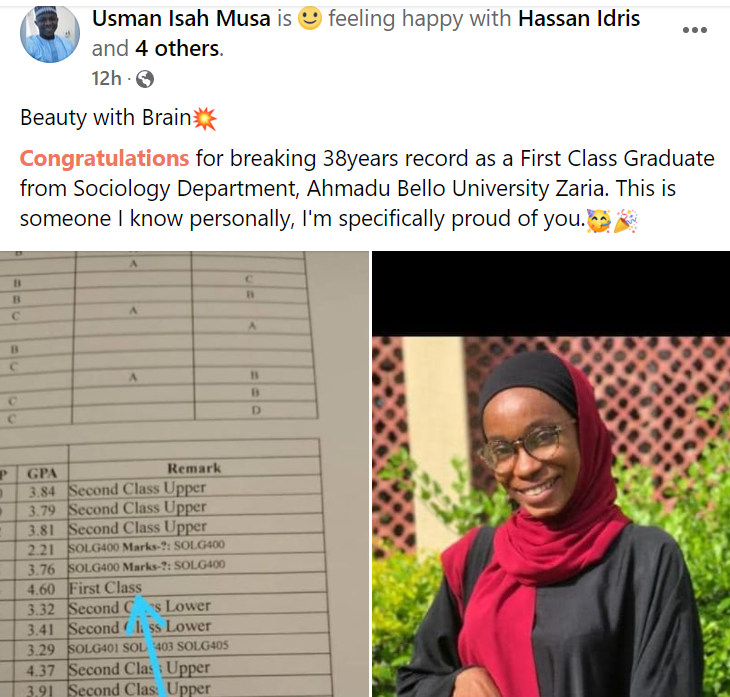Education
Nigerian growing army of First-Class graduates
Published
2 years agoon

Hundreds of Nigerian students are graduating with first-class degrees not just in various Nigerian universities but also in foreign universities, putting the name of the country on the global academic calendar.
A First Class degree is earned when an undergraduate scores Cumulative Grade Point Average (CGPA) of 4.50 and above upon graduation.
In 2023 alone, Nigeria boasts hundreds of such brilliant minds, graduating top of their classes, bringing honour to not just their proud families but also to their country of origin, Nigeria.
Standing tall on the podium regaled in her graduation gown and beaming with a smile that can make the world pause for a reflection, Udeh Chiamaka Victoria, was a testament of ingenuity and brilliance.
She graduated with first-class honours in medicine from Stavropol State Medical University, one of Russia’s oldest universities. She stated that it was not an easy journey and that she could not have done it without the support of her family.
READ ALSO: EFCC arraigns 11 OAU undergraduates for alleged Internet Fraud
Chiamaka is just one of the tiny fractions of these Nigerian brilliant minds. In Febuary, 2023, a total of 10 students of the University of Medical Sciences, Ondo town, Ondo State graduated with First-class out of the 327 graduands of the institution.
Similarly, a 20-year-old female student of Baze University, Morenikeji Adebanjo, emerged as the overall best student at the 10th convocation ceremony of the university.
Adebanjo, a graduate of Law, came overall best with a Cumulative Grade Point Average of 3.81 on a scale of 4.0, from the 388 undergraduate candidates.
Also, Oseloka Zikora, a Mass Communication student, came overall best with a 5.0 CGPA on a scale of 5.0 in the Master’s programme among 225 candidates.
Recently, a 27-year-old IDP from Borno state, Amos Ishaku, emerged as the overall best student of the Edo State University Uzairue.
Similarly, a young Nigerian digital marketing maverick, Emanaobong Antia, emerged as a shining example of academic excellence and determination in the ever-evolving landscape of digital marketing.
A recent graduate from the prestigious Robert Gordon University in Scotland, Antia has not only made his homeland proud, but also set an inspiring benchmark for aspiring digital marketers worldwide.
With a Master of Science (MSc) degree in Digital Marketing, awarded with distinction, and the prestigious title of “Best Overall Student,” Antia has become a beacon of success and inspiration for the digital marketing community.
Olaoluwa Shadrack Araromi, emerged the Best Graduating Student in the Faculty of Engineering, Cyprus International University, North Nicosia, Cyprus. Olaoluwa, who had a CGPA of 3.94 out of possible 4.00, came top in his Master’s degree programme in Environmental Science.
Also, 19-year-old Accounting student of Joseph Ayo Babalola University (JABU), Oluwagbemiga Akinseye, emerged as the best-graduating student for the 2021/2022 class at the 13th convocation of the institution. He graduated with a Cumulative Grade Point Average ( CGPA) of 4.87.
Eniola Oluwagunna graduated with first-class honours in Mass Communication with a cumulative grade point average of 4.91, emerging as the best-graduated student of Crawford University just like her father did in 1998 at the same school.
No fewer than 158 students of Obafemi Awolowo University (OAU), Ile-Ife, Osun State also bagged First Class degrees at the institution’s 47th Convocation programmes.
READ ALSO: Bawa tasks undergraduates to stand up against corruption
In the United Kingdom, the proportion of Nigerian students graduating with top degrees has soared in the past five years, with a quarter of last year’s candidates leaving university with a first class, a dramatic increase from just 17 per cent in 2020.
According to an educationist, Professor Sola Abinjo, the increase in the number of students graduating with first class is reflective of advancement in knowledge and access to information through the Internet.
“There is an increasing number of serious-minded students who deploy information communication technology to achieve excellent results. Furthermore, the total number of graduates produced has been increasing over time, especially since the 1980s. Consequently, the proportional increase in the number of first class students probably reflects the increase in the number of graduates produced compared with the figures of the 1960s up to the 1970s,” he added.
Talking about the influence of the Internet in making academic resource more available to students, Prof. Abiodun Odunlaja of Univeristy of Ibadan, noted that information communication technology (ICT), has contributed immensely to the rise of first class graduates.
“To that extent, where students are serious with their studies, it is easier to make a first class today than it was in the past. The methods of assessment are also more liberal today than they were in the past. With this, it is very easy for serious-minded students to score higher grades,” he said.
Besides, he added that there is improvement in learning systems, which are becoming more learner-focused than teacher-centred; giving room for conscientious students to explore and research widely on their own any subject beyond the four walls of the classroom.
A professor of Geography at Lagos State University (LASU) Fidelis Agbo, said all that is required to get a first class in most Nigerian universities is for students to score 70 per cent or more in their courses and any student that makes this a goal can easily achieve it, especially in private universities where there are less distractions and better learning facilities than what obtains in the poorly funded Nigerian public universities.
“First class students are seldom found in bars, clubs or parties. Most often, they are too serious minded. Some of them may try to maintain a balanced lifestyle but they are rarely at the extreme. These are not sacrifices that many students would want to make,” he added.
You may like


Police graduate 6 PhD holders, 169 others as spies


NAF to graduate 49 BC cadets, 1,549 recruits on April 30


Female student first in 38 years to graduate with First class


#JusticeForOliver: Taraba youths protest over killing of graduate by a police officer


Provost denies delaying students’ graduation 5 years after


NOUN graduates cry out over discrimination
Trending

 Football7 days ago
Football7 days agoNFF dismisses claims of DR Congo’s World Cup qualifying disqualification

 Entertainment6 days ago
Entertainment6 days agoSinger Simi sparks debate after calling for death penalty for rapists

 Football1 week ago
Football1 week agoCAF set for quarter-final draws in Cairo as road to continental finals takes shape

 Business5 days ago
Business5 days agoNaira mixed across markets as official window dips, parallel market strengthens

 Football6 days ago
Football6 days agoGalatasaray thrash Juventus 5–2 to hand Spalletti first champions League defeat

 Football1 week ago
Football1 week agoPardew praises Arteta’s four-competition charge, backs Liverpool for Champions League triumph

 Business6 days ago
Business6 days agoNaira hits N1,337 against Dollar amid positive market sentiment

 Crime7 days ago
Crime7 days agoSouth African Court charges three over murder of Nigerian e-hailing driver in Pretoria

